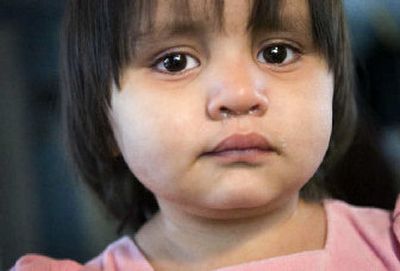Healing far from home

She can’t help but turn heads now, the tiny child in the plaid party dress.
With her wide, brown eyes and shy smile, the toddler from El Salvador pads around in petite pink shoes, cradling a baby doll and demanding yet another piece of chocolate.
But just two months ago, Margarita Hernandez arrived in Spokane a very sick little girl. A hole in her heart and a deformed artery left the 2-year-old listless and limp, underweight and unable to connect with the world around her.
“She didn’t have any life,” recalled Shirl Lewis, a longtime foster mother with Healing the Children, the Spokane-based nonprofit that specializes in providing medical aid and other care.
“I’d take her to the Rosauers and people didn’t want to look at her. She almost looked like a dead baby.”
But thanks to Spokane surgeons and specialists who donated the skills and time for the more than 5-hour surgery, Margarita’s tiny heart has been repaired.
The girl from the small agricultural village of La Papalota likely will live a normal life, said Dr. Neil Worrall, a cardiothoracic surgeon on the pediatric surgery team at Sacred Heart Children’s Hospital.
“It’ll take a while to catch up on her growth,” he said. “But this was a totally correctable condition. In other words, she’s fixed.”
Such an outcome was almost unimaginable for Margarita, the third child of a poor farmer and his seamstress wife. The child was born with a hole the size of a nickel between the bottom chambers of her heart, and a deformed coronary artery.
“There are no surgical options in a lot of the Third World,” Worrall said. “And the kids just die.”
Margarita already had developed pulmonary hypertension, a potentially fatal illness common to children with congenital heart defects. Her parents were becoming increasingly frantic, as was her aunt, a novice nun with the Sisters of Providence in Spokane.
“I thought, my niece is dying and they don’t even have the money to bring her to the hospital in San Salvador,” Sister Margarita Hernandez said through a translator. “Then someone suggested, ‘Why don’t you call Sister Fran?’ ”
That would be Sister Frances Stacey, a member of the Sisters of Providence who is serving a mission near La Papalota. Within a week of receiving the phone call, Sister Fran had obtained a visa for the baby and was busy contacting Shirl Lewis and her husband, James.
“She was pretty pushy,” recalled Shirl Lewis, laughing.
“She’s like a steam train once she gets going,” noted Sister Rosalie Locati of Sacred Heart, who helped start the process that culminated in surgery.
Another child, a young boy, was scheduled for care before Margarita, but doctors determined his condition could wait a few months. Suddenly, the little girl from La Papalota was at the top of the list.
“We’re really careful about who we pick,” said Shirl Lewis. “We pick kids who are very ill, but with a good chance of recovery.”
Doctors believed Margarita’s problems could be cured with a single surgery and appropriate care.
So Margarita’s parents, Elsie and William Hernandez, agreed to send her on the long trip to America.
“It is very hard for her to be separated from her daughter,” Sister Margarita said of her sister. “She’s really appreciative knowing that the ones taking care of her daughter are very good people.”
And they’re experienced people as well. Margarita is the 40th foster child to be welcomed to the Lewis home through the agency that started in Spokane in 1979.
The Lewises, both 62, have continued the work because they believe in the mission of Healing the Children, the agency whose slogan is “changing the world, one child at a time.”
The pair said they understand better than anyone that the program helps only a fraction of the children who could benefit from medical care. But they say they focus on the ones they can help, like Margarita.
“She’ll go back home and have a good life,” Shirl Lewis said, nodding at Margarita. “She’s a happy baby, a happy little girl.”
That sentiment is echoed by Worrall, the surgeon.
“For every one we help, there’s 50 to 100 who don’t get care,” Worrall said. “Unfortunately, it’s just a drop in the bucket, but it’s 100 percent impact in this family.”
The children’s hospital medical team also included Drs. Hrair and Carl Garabedian, a father-son duo from the Northwest Center for Congenital Heart Disease, and Dr. Mitch Minana, anesthesiologist, plus support staff. Medical services and support were donated for the procedure, which Worrall estimated would typically cost between $25,000 and $30,000.
That’s far out of reach of Margarita’s parents, who earn about $1,200 a year, Sister Margarita said.
The Oct. 19 surgery went very well, doctors and caregivers agree. Since then, Margarita has gained weight – and the energy to laugh and play like a normal toddler.
She likes the chocolate that Shirl Lewis keeps in a cupboard, and she likes the pink-and-black plaid dress she wore to her gala second birthday party on Nov. 13.
The Lewises will learn today whether Margarita is well enough to go home. They hope she is, of course. Back in El Salvador, Elsie Hernandez is counting the days until her daughter returns.
But James Lewis said they’ll still miss their 40th foster child as much as they missed their first.
“It doesn’t get any easier,” he said. “But with our knowledge of that family, it’s OK.”